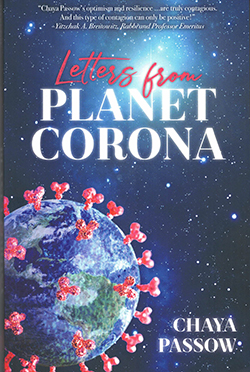Letters from Planet Corona by Chaya Passow; City of Gold Press, 2020; ISBN 9789655-994056; 227 pages; available on Amazon. Amazon.com : Letters from Planet corona
By Donald H. Harrison

 SAN DIEGO – An American living in retirement in Jerusalem, Chaya Passow has been described by her friends as a “pollyanna,” one who tries to see the best in everything and everybody. So when the coronavirus pandemic confined many people to their homes – except to go out for necessities or approved errands – she unsurprisingly decided to “glean from this unprecedented experience any lessons for better understanding the human condition, for self-improvement, for a closer connection to Hashem and others.”
SAN DIEGO – An American living in retirement in Jerusalem, Chaya Passow has been described by her friends as a “pollyanna,” one who tries to see the best in everything and everybody. So when the coronavirus pandemic confined many people to their homes – except to go out for necessities or approved errands – she unsurprisingly decided to “glean from this unprecedented experience any lessons for better understanding the human condition, for self-improvement, for a closer connection to Hashem and others.”
Her world and that of others clearly had changed, as if everyone were living on another planet. She adopted that idea as a literary conceit. Her letters, from March through October of 2020, became a running travelogue — not of physical spaces, but of mental places that her imagination and circumstances took her on the Planet Corona. Often, in this collection of letters, she drew on formal Jewish sources such as the Talmud and informal ones such as folk tales.
Commenting on the fact that no one in 2019 would have been able to predict what 2020 would have been like, she recited the story of the rabbi who was asked by authorities where he was going. “I don’t know,” he answered, arousing their suspicions. It was decided to keep him in jail until he answered the question definitively. Finally, the rabbi told the authorities: “I told you the truth. I intended to go to the study hall, but you see, I ended up in jail. So, in fact, I didn’t know where I was going.”
A bit later in March 2020, Passow reflected: “A hospital is a great leveler of the playing field. Sicknesses, including coronaviruses, make no distinctions among genders, religions, ethnicities, and social status. In the hospital, all are represented as patients, as orderlies, as nurses and as doctors, and it is a model for tolerant coexistence and mutual support. Today, on some level, the whole planet is one big hospital and wall have some role within it. Once, a very long time ago, all the inhabitants of the planet were ‘in the same boat.’ We refer to it as Noah’s Ark. The predecessors of all humanity, of all peoples, all races, all nationalities, and all religions shared a space, experiences, and the common fate of surviving the Flood. Today that Ark is Planet Corona.”
Sneezing one day into the crook of her arm, Passow meditated on elbows, remembering the well-worn story of people who could not bend their arms sitting facing each other at a long table, with food aplenty before them, but given their inability to bend their arms, they could not feed themselves. How miserable and hungry they were in Gehinnom! In Gan Eden, people with the same physical condition sat across from each other at a table heavily laden with food, and they were happy. Why? They were able to feed each other. On Planet Corona, Passow concluded, people can feed each other’s health by wearing masks.
In another of her letters, the author reflected on how living in sukkahs reminds us of the impermanence of life as well as about the Israelites’ journey with Moses through the desert. On Planet Corona, she writes, one doesn’t need to live in a sukkah to understand just how fragile life can be. On the other hand, it behooves us to remember how God also protected the Israelites during their trek by surrounding them with clouds of glory. “So,” she affirmed, “let’s be joyous this Sukkot. We can luxuriate in our dependence on a Power much greater than any that we have previously trusted.”
*
Donald H. Harrison is editor of San Diego Jewish World. He may be contacted via donald.harrison@sdjewishworld.com